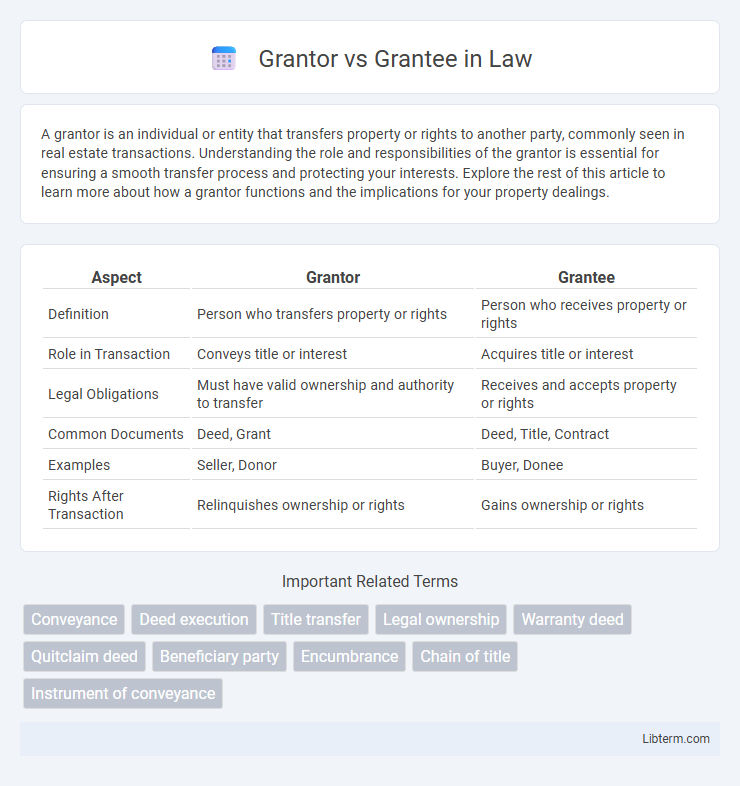A grantor is an individual or entity that transfers property or rights to another party, commonly seen in real estate transactions. Understanding the role and responsibilities of the grantor is essential for ensuring a smooth transfer process and protecting your interests. Explore the rest of this article to learn more about how a grantor functions and the implications for your property dealings.
Table of Comparison
| Aspect | Grantor | Grantee |
|---|---|---|
| Definition | Person who transfers property or rights | Person who receives property or rights |
| Role in Transaction | Conveys title or interest | Acquires title or interest |
| Legal Obligations | Must have valid ownership and authority to transfer | Receives and accepts property or rights |
| Common Documents | Deed, Grant | Deed, Title, Contract |
| Examples | Seller, Donor | Buyer, Donee |
| Rights After Transaction | Relinquishes ownership or rights | Gains ownership or rights |
Understanding Grantor and Grantee: Key Definitions
The grantor is the individual or entity that transfers legal rights or property ownership through a deed or legal instrument. The grantee is the recipient who receives those rights or ownership from the grantor. Understanding the roles of grantor and grantee is essential in real estate transactions, property law, and deed documentation.
The Role of a Grantor in Property Transactions
The grantor is the property owner who transfers title or interest in real estate to the grantee through a legal deed. This role involves ensuring clear ownership, executing the deed correctly, and often providing warranties about the property's status. The grantor's responsibilities are crucial in establishing a valid and enforceable property transfer under real estate law.
The Grantee: Rights and Responsibilities
The grantee obtains legal ownership and title of the property, enabling the right to possess, use, and transfer it according to the deed's terms. Responsibilities include adhering to any deed restrictions, paying property taxes, and maintaining the property in good condition. Understanding these rights and obligations ensures the grantee fully benefits from and complies with property ownership regulations.
Legal Differences Between Grantor and Grantee
The legal distinction between a grantor and a grantee lies in their roles in property transfer: the grantor is the party who conveys or transfers the title or interest in real estate, while the grantee is the recipient of that title or interest. Grantors must possess clear ownership and the legal capacity to transfer property, ensuring the deed is valid and enforceable. Grantees, conversely, gain legal rights to the property upon acceptance and recording of the deed, which secures their ownership against third-party claims.
Types of Deeds: Impact on Grantor and Grantee
Types of deeds, such as warranty deeds, quitclaim deeds, and special warranty deeds, significantly affect the rights and responsibilities of both the grantor and grantee. Warranty deeds provide the grantee with the strongest protection by guaranteeing clear title and full ownership, placing a higher risk and liability on the grantor. Quitclaim deeds offer minimal protection to the grantee as the grantor only transfers whatever interest they hold without warranties, impacting the grantee's title security and leaving the grantor with limited legal obligations.
Common Mistakes Involving Grantors and Grantees
Common mistakes involving grantors and grantees often include failing to verify the identity of parties, which can lead to fraudulent transfers or title disputes. Another frequent error is the improper execution or recording of deeds, resulting in unclear ownership or liens against the property. Misunderstandings about the rights and responsibilities of both grantors and grantees can also cause legal conflicts and delays in property transactions.
Importance of Accurate Grantor and Grantee Information
Accurate grantor and grantee information is crucial for clear title transfer and preventing legal disputes in real estate transactions. Precise identification ensures the rightful parties are recognized, safeguarding property rights and maintaining public records integrity. Errors in names or details can lead to title defects, complicating future sales or financing processes.
How the Grantor-Grantee Relationship Affects Ownership
The grantor, who transfers property rights, holds legal ownership until the deed is executed and delivered to the grantee. This relationship crucially determines the timing of title transfer, with the grantee acquiring equitable and eventually full ownership once the grantor's conveyance is complete. Any defects or encumbrances in the grantor's title directly impact the grantee's acquired ownership and the property's marketability.
Grantor vs Grantee: Frequently Asked Questions
The grantor is the party who transfers or conveys property rights, while the grantee is the recipient of those rights in a legal transaction. Common questions often address the grantor's responsibility for clear title, the grantee's rights after the transfer, and the difference in their roles in deeds and title documents. Understanding these distinctions is key in real estate transactions to ensure proper legal ownership transfer and enforceable property rights.
Final Thoughts: Choosing the Right Terms in Real Estate
Selecting precise terms like "grantor" and "grantee" in real estate documents ensures clarity in property transfer responsibilities and legal rights. Properly defining the grantor, the party conveying the property, and the grantee, the recipient, helps prevent disputes and enhances contract enforceability. Prioritizing accuracy in these definitions supports smoother transactions and protects both parties' interests.
Grantor Infographic

 libterm.com
libterm.com